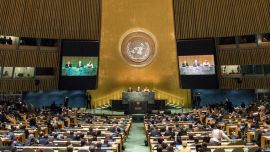Argentina’s government authorised the restricted return of domestic flights on Thursday, after seven months of inactivity during the coronavirus pandemic.
The Alberto Fernández administration published protocols for airlines and passengers in the Official Gazette, after the return of aviation had been confirmed by ministers Mario Meoni (Transport) and Matías Lammens (Tourism & Sports) on Wednesday.
In Resolution 221/2020, the Transport Ministry said that service operators will have to follow all procedures and protocols recommended by the Health Ministry under the control of ANAC civil aviation regulatory agency.
The latter will approve timetables in consultation with Argentina’s provincial governors (or City Hall in the case of the Federal Capital) "in line with the epidemiological situation in each zone of the country as determined by the respective health authorities." The move effectively puts the onus on regions to decide.
According to reports, initially flights will only be available to those classified as essential workers, individuals with "reasons of force majeure" (i.e. internally stranded or with a need to return home) and those who must travel for medical reasons, plus a companion if necessary. Expanding seats to tourists and passengers will come later on, with officials saying it would happen before the end of the year.
Taking questions from reporters on Wednesday, Meoni said that he hoped to have news about international flights in the next week, though he remarked that only Argentine citizens, foreigners resident in the country or those under exceptional circumstances were allowed to enter Argentina. According to Clarín, he said "the hope is that by December we can have tourism in Argentina."
Pablo Ceriani, the president of state carrier Aerolíneas Argentinas, welcomed the news, expressing "enthusiasm" over the return of regular flights.
He said the airline had filed a plan with ANAC seeking 47 flights weekly (between two and four per province). He admitted the decision was "up to the provinces" though.
Ceriani told Télam that “flying is very safe with an extremely low risk of contagion if norms are followed,” saying that "Aerolíneas Argentinas has strict hygiene and safety protocols for every stage of the flight."
During repatriation flights earlier this year there was practically no contagion among crew or passengers, Ceriani confirmed to the state news agency.
For domestic flights, passengers would have to be connected to the App Cuidar mobile phone app, said the Aerolíneas chief. Meals would not be served in order to prevent people from removing their face-masks, he added.
The government’s resolution also covers long-distance bus and coach transport, with strict protocols to minimise the risk of Covid-19 infection.
Rules and protocols
Under the new rules, each passenger that travels must display a "Certificado Unico Habilitante para Circulación-Emergencia Covid 19" permit clearing them for travel. The resolution asks service operators to take extreme precautions to prevent the spread of coronavirus, ensuring optimal health conditions for passengers and airline staff alike.
The Transport Ministry justified its decision by pointing out that domestic air transport "is strategic for the development of regional economies and complementary to other productive activities and its revival is a core activity for beginning a progressive and gradual return to normal."
The resolution adds: "The period of suspension has permitted us to advance in determining clear guidelines for health controls in domestic flights, permitting the implementation of health protocols designed for such services."
Airport operator Aeropuertos Argentina 2000 SA has already tested the protocols, which include measures such as social distancing within terminals, continuous disinfection at all points of high contact and training all staff in prevention along with the obligatory use of face-masks while providing "clear and specific information.
All terminals will have protective acrylic screens in all check-in areas and boarding gates with alcohol-based gel hand sanitiser dispensers replenished daily, according to the resolution.
Ezeiza International Airport has been subjected to various preventive measures in preparation for the return of flights with social distancing in all sectors of all terminals. The check-in area now includes self-check-In facilities and the option of queuing outside with a roof now provided over the pavement along with seating. Food trucks now complement the catering facilities.
Checks
The protocol for domestic flights will include compulsory temperature controls, the use of triple-layered face-masks for all passengers before, during and after the flights and entry into airports, which will be limited to passengers and persons accompanying the handicapped. Blankets, headphones, meals, snacks and magazines will all vanish from service onboard flights apart from long-range international trips, which will offer individually packed menus.
In theory, everyone will follow the same rules. VIP lounges will remain closed at airports and boarding will proceed in reduced groups maintaining social distancing. During the flight health and safety will be guaranteed by the installation of air conditioning with special HEPA (High Efficiency Particulate Air) filters which constantly renew cabin air.
Apart from the use of alcohol-based gel hand sanitiser, aircraft must be disinfected with products recommended by the World Health Organisation (WHO).
In the event of a suspected case of Covid-19 during the flight, voluntary medical assistance must be requested from those onboard and if not available, the flight attendant must don a “Universal Precautionary Kit” before approaching the passenger and notify the pilot, apart from activating a specific protocol.
Finally, the airline crew will tell passengers in what order they should disembark, starting from the front and always respecting social distancing. Once landed, the passengers must then consider the health protocols of the provinces of arrival.
– TIMES/TELAM/NA

























Comments